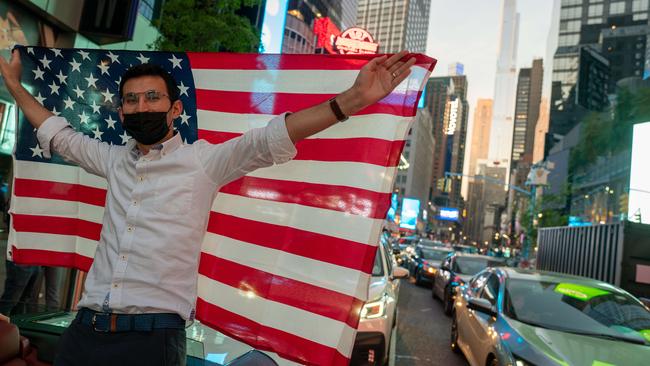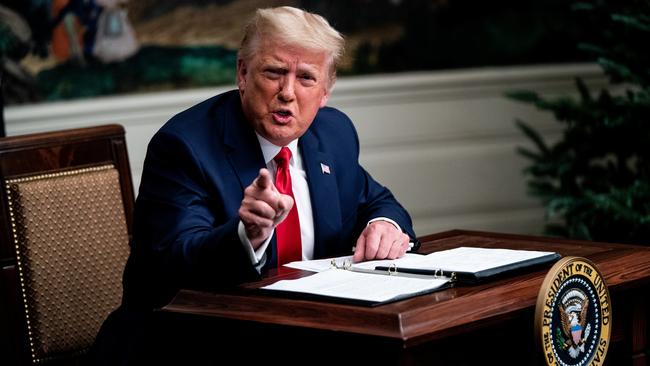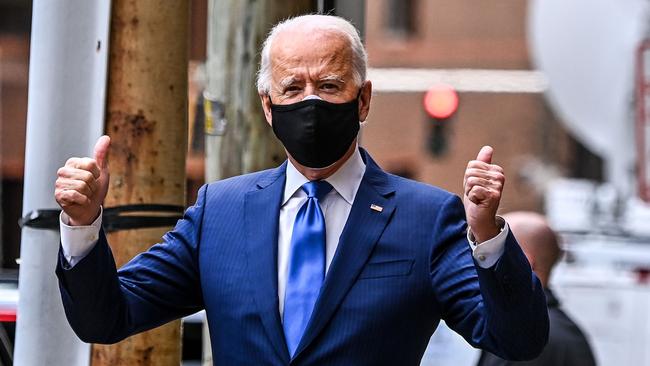American election fallout: Donald Trump and the divided states of the US
One month after the most divisive election in modern history, America remains polarised in the wake of a president whose reign and demise continues to split the country in two.
SA Weekend
Don't miss out on the headlines from SA Weekend. Followed categories will be added to My News.
It began with a few horns and turned into an eight-hour symphony. People erupted into the streets, parks and tourist attractions, abandoned by COVID-19. Although most wore face masks, there was no silencing the crowd. Not today.
“Bye Don!”, “You’re fired!” and “Love trumps hate” signs, swayed in the air, amid American and Pride flags. The pops of champagne bottles met a sea of applause.
The news of America’s new president-elect traded social distancing for hugs with strangers, street parties with jazz bands occupying intersections, DJs on apartment steps, and revolutions on every corner.
Filled cars driving past were just as much a part of it. Ecstatic passengers hung out of windows, gifting the crowd enormous smiles and celebratory fists in the air. Others stood peacefully watching from apartment windows, with “Make America Kind Again” messages draped down the fire escapes.
After almost a year buried in our apartments, robbed of physical human connection by COVID-19, for New Yorkers, this was doubly cathartic. The blazing sun felt symbolic, as though something had shifted, beyond the season. That things were going to get better.
I overheard someone say on the street: “I can’t think of any moment in my life when this many people share so much joy together.” This perfectly describes the intoxicating energy in New York City on November 7, 2020.
We could all agree. That day, one month ago, New York was resuscitated. But inside the joyous crowds, there was also hatred.

A knee-high Donald Trump character was set alight, igniting a loud cheer. There was the “hanging” of a life-size version of Trump, as the crowd chanted “not my president”. Trump paraphernalia was doused in fake blood. And the mob hurled eggs and screamed “New York hates you” at any Trump supporters who dared show their faces.
This President’s well-known shortcomings undoubtedly merit strong opinions. He’s combative and speaks without a filter.
He berates individuals, from the White House, in public rallies and through 3am Twitter tirades. He inspires division and hate, instead of unifying people. He’s shattered and dismantled the political system as we know it. His four-year term has left American citizens with more questions than answers. And much more anger.
“I don’t know how Trump still got such quite a high popular vote,” says New Yorker Daphne Lee. “I think we still have more nut jobs in this country than we imagined. Someone literally said to me: ‘If Biden wins, people who die from communist totalitarianism around the world will be more than COVID’. People think we need a dictator to fight communism or something.”
Fellow New Yorker Tarene Fung says she thought it might have been a joke when she heard that some old high school classmates had a Make America Great Again party.
“These are all teachers, too,” she says. “They’re moulding the young minds of my extremely diverse neighbourhood. If you want to support Trump, fine, but have a logical stance and be able to back up why. But no one can because there is none.”

Vin Tee, an American who lived in Sydney, believes “Trump is a symptom of a deranged society”. He says the fact that the presidential race was so close “says a lot”.
In New York, a city that welcomes all, it’s not OK to be impartial about Trump.
If the election has revealed anything, it’s how divided America still is today. Throw in COVID-19 and Black Lives Matter (BLM), and we’re at risk of reverting to a culture of segregation. But one month on from election day, Trump’s reign and demise continues to split the country in two.
It’s also challenged and hijacked Australians’ dreams to live in the US.
“The nation is fractured and showing the signs of the strain. It’s interesting to see how many people see Trump as a strong leader,” Victorian expat Bryan Taylor says.
“Yet, it’s fractured either way. Both sides have demonised each other to the point where, unless a viable third party comes up and the electoral college is removed, the country will grow further apart. It isn’t a functioning democracy. Modern America is failing its own citizens.”
Comedian Michael Rapaport’s stinging rhetoric, cursing Trump on Twitter, received more than 24,700 shares and 76,300 likes. “Pack your bags, you’re out” was the nicest thing he said, amid the profanity that went viral, further stoking the social media cauldron.
Media personality Kathy Griffin revoked her apology for posting a ghoulish, image of herself holding a model of Trump’s decapitated head. In fact, she re-shared the post. After publicly condemning Trump for his hateful rhetoric, Griffin is playing the same games she’s fighting. Excused as art aimed at “making noise”, hers is a theatrical display that symbolises an enraged culture.

From a macro perspective, the line is blurring between ultraconservative Trump followers and the Far Left, when it comes to fuelling division. While everyone has a right to their own voice, what’s this really telling us about where the US is, as a functioning society?
Victor Hanson, Senior Fellow at the Hoover Institution – a conservative public policy research think-tank based in California – believes part of the Trump rage is coming from structural societal issues.
“When you’ve got an $80,000 student debt and a worthless degree, you can’t get a good job or buy a house, get married or have kids… they shift all their angst onto the system,” he says. “These are the most disenfranchised people.”
University of Connecticut Department of Sociology lecturer Jordan McMillan talks about the phenomenon of what’s unfolding from the perspective of how we’re socialised. She’s interested in how inequality is produced and reproduced through social institutions.
“It’s a kind of mental gymnastics,” she says. “It’s easier to double down on a few things that align with your values and throw out the rest of what a leader says, rather than admit you made a mistake and change your mind. People don’t like to be seen to be wrong.
“We’re essentially responding to the environments in which we were raised. We’re socialised into an identity and deviating from that can be really confusing.”
McMillan says Americans are conditioned into thinking there are just two identities: Liberal and Conservative. Democrat or Republican.
“But what people don’t realise is this isn’t the case. For example, ‘leftist’ is different from Liberal,” she says.
“But unless you have access to the tools to tap into, to start to be critical of yourself, it’ll probably be a long time until you question what you’ve always thought.
“America isn’t racist because of Trump. Sure, Trump is racist, and he incites violence, but America’s race problems have existed since white settlement. We seem to believe that racism was fixed but it’s not. ”
She says it’s important for Americans to be able to discern between the two stances: on the one hand that all of America’s racial problems are because of Trump; and the other that we’ve lived in a system of oppression since our ancestors were here.
“There’s a lot of talk about how we need to meet in the middle and, while this is nice in theory, there’s no halfway when it comes to issues of human rights. What I think’s going on with people celebrating exuberantly is the excitement that the conversation is closer to being acknowledged.”
What is often accepted as democracy is deeply inequitable. The “vote blue, no matter who” mindset is a push towards change. It’s an understanding that the idea of democracy itself is flawed. “Therefore, social upheaval is equality in process,” McMillan says. “And, getting on board with Joe Biden is easier, mentally and emotionally.”
Whether it’s Bernie Sanders, a Democratic Socialist or Joe Biden, a Centrist Democrat, it’s the Democrat’s call to arms to unite that fed into the “anything and anyone but Trump” movement.
The sociological concept “collective effervescence” might begin to help explain the violence-provoking behaviour on the streets. When big groups come together, this can inspire behaviour that individuals might not otherwise partake in, alone.
“Whether it’s a Trump rally with all the supporters arming themselves, or the people in the streets, cheering as they burn effigies, the energy is stronger because of the group process. They almost create their own atmosphere,” McMillan says.
A herd mentality that generates a powerful sense of belonging, and, therefore, confirms an identity. “It’s sort of like electricity that’s shared within a group of like-minded people,” she says.
Yet, the Donald Trump effigies didn’t only light up the east and west coast. It happened in other countries, such as Mexico and the UK. Political figures are traditionally set afire in Lewes, England, and a giant inflatable ‘baby’ Trump was a spectacle in recent years.
Society and culture are polarised by politically manipulated media (and yes, social media). We are asked to discern between fake news and what’s real. Told to address how we use it and respond to it.
Families and relationships are being torn apart by this 2020 vote.
The degree to which Trump is hated by many is not necessarily the point here. But the phenomenon does serve as an opportunity to delve into the reasons why one individual evokes such deep rage. To look beyond the foibles of the character and see what it reveals in us all. Trump has jolted the world awake and given us the chance to recalibrate, not just the political system, but society as a whole.
It’s time to start conversing with our neighbours. Find out what they think actually makes America, and all nations for that matter, great.
While there’s only one Trump, he isn’t the first in history to shake up the system. And he won’t be the last. As experts such as McMillan remind us, this stands as an opportunity to reach a hand-out to those who see the world in different ways. To have now, quite difficult conversations, to drop the finger-pointing and find our common human ground again.
Adelaide-raised Amanda Smith is a New York-based freelance writer.




